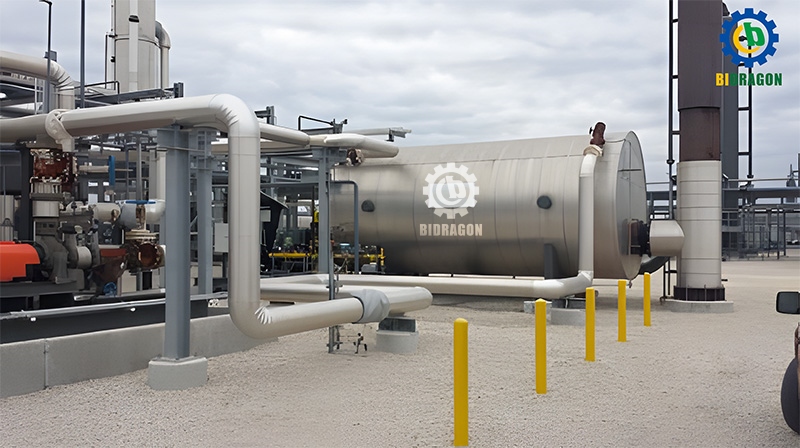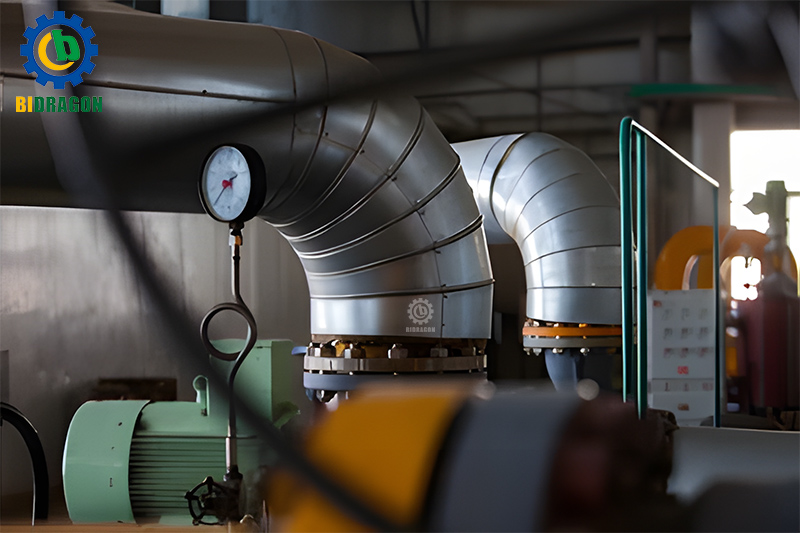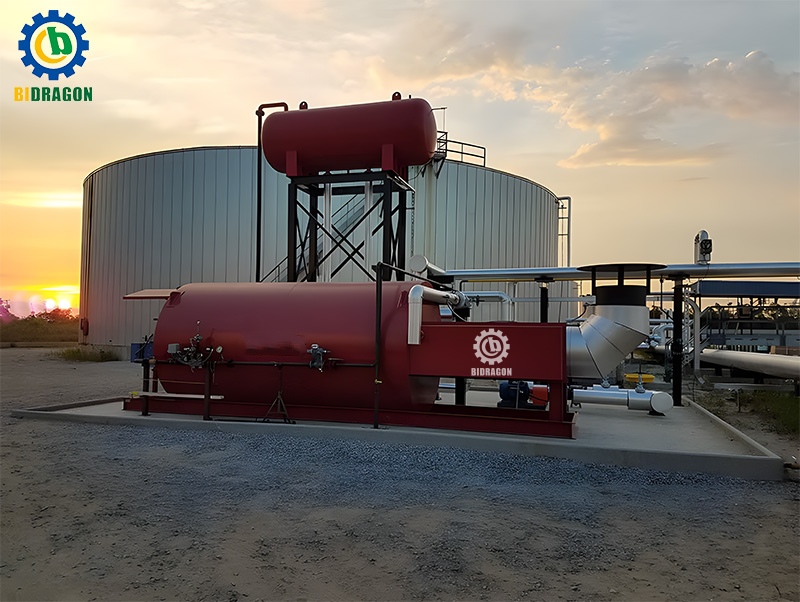Thermal Oil Boiler is a kind of industrial heating equipment that uses thermal oil as the heating medium. Unlike traditional steam boilers, thermal oil boilers are able to provide a stable heat source at higher temperatures under low-pressure conditions, and are widely used in a variety of fields such as petroleum, chemical, and food processing. In this article, we will discuss the advantages of thermal oil boilers in detail to help companies make informed decisions when choosing a heating system.
What is a thermal oil boiler?
A thermal oil boiler is a device that generates heat through combustion and transfers it to hot oil. The hot oil is heated and then pumped to equipment or heat exchangers in the production process for indirect heating. The hot oil used in thermal oil boilers can withstand higher temperatures without the need for high pressures than traditional steam heating systems, which gives thermal oil boilers a unique advantage in terms of safety and efficiency. Thermal oil boilers are widely used in industries that require stable, high-temperature heating, such as petroleum, chemical, food processing, and textiles.
Working principle of thermal oil boiler
The working principle of a thermal oil boiler is relatively simple. First, a burner inside the boiler converts fuel (such as natural gas, oil or electricity) into thermal energy to heat the thermal oil in the boiler. The heated thermal oil is pumped to the piping system to transfer heat to the process equipment or heat exchanger that needs to be heated. The thermal oil is heated without generating steam or high pressure, making it safe and efficient to operate. The temperature of the thermal oil boiler can be precisely adjusted by the control system to ensure a stable and reliable heating process.
Closed Circulation of the Hot Oil System
The thermal oil circulates continuously in the system, ensuring a constant supply of heat to the equipment to be heated. During this process, the hot oil does not come into direct contact with the outside world, avoiding problems such as water vapor leakage that may occur in traditional steam heating systems.
Non-Pressurized Design
Hot oil boilers do not need to rely on high-pressure operation, avoiding the potential safety hazards associated with high-pressure boilers. Therefore, thermal oil boilers are superior to traditional steam boilers in terms of safety and are suitable for processes that require high temperatures but not high pressures.

10 advantages of thermal oil boilers
1. High energy efficiency and energy saving
Hot oil boilers are more energy efficient than traditional steam boilers. Because thermal oil can operate at higher temperatures at lower pressures, thermal oil boilers transfer heat more efficiently, reducing energy waste. Efficient heat transfer not only reduces energy consumption, but also significantly lowers operating costs and improves overall productivity.
2. Installation flexibility
The design of the thermal oil boiler makes it extremely flexible in terms of installation. It can be installed indoors or outdoors, customized according to the requirements of different plant layouts. Especially in the case of limited plant space or special requirements, thermal oil boilers can be flexibly adapted to avoid the space constraints faced by traditional steam boilers during installation.
3. Low maintenance requirements
The maintenance of thermal oil boilers is relatively simple, compared with traditional steam boilers, thermal oil boilers have lower maintenance costs and workload. The closed loop design of the thermal oil system reduces scaling and corrosion problems, and avoids the maintenance challenges of steam valves and drainage systems that are common in steam systems. Although thermal oil boilers still require regular inspection and cleaning, their routine maintenance workload is much lower than that of steam boilers.
4. Lower Operating Costs
The operating costs of thermal oil boilers are usually lower for the following main reasons:
No chemical treatment is required
The heating medium of a thermal oil boiler is thermal oil, which does not require chemical treatment of the water as in the case of a steam boiler, thus eliminating the cost of chemical procurement and management.
High efficiency and energy saving
The efficient heating capacity of thermal oil boilers reduces energy consumption, helping companies to reduce energy bills and lower operating costs.
5. Higher Safety
Since thermal oil boilers do not rely on high-pressure operation, they significantly reduce safety risks such as explosions and leaks compared to steam boilers. The non-pressurized design of thermal oil boilers makes them safer to operate, especially in industrial environments that require strict safety management.
Reduced Risk of Explosion
Hot oil boilers are not subjected to high pressures as steam boilers are, reducing the risk of explosions caused by excessive pressure.
Avoiding Steam Leaks
High-pressure steam in a steam system is prone to leakage due to piping ruptures and other malfunctions, posing a threat to equipment and personnel. The hot oil system effectively avoids this problem through its non-pressurized design.
6. Reduced Personnel Requirements
Hot oil boilers are easier to operate and maintain than steam boilers, so fewer full-time operators are required. Due to the higher degree of automation and lighter operator workload, companies can reduce their reliance on technicians, which saves on personnel costs and improves overall work efficiency.
Automated control system
Thermal oil boilers are usually equipped with an automated control system that automatically adjusts the operating parameters according to the set temperature and flow rate, reducing the need for human intervention.
Reduced Operator Training Requirements
Compared with traditional steam boilers, thermal oil boilers are relatively simple to operate, and companies do not need to spend a lot of time and costs on complex operator training for their employees.
7. Versatility and wide range of applications
Thermal oil boilers are suitable for a wide range of industries, especially those that require high temperatures and a stable heat source. Its ability to withstand high temperatures and provide stable heating not only replaces traditional steam boilers, but can also be used in high-temperature processes such as crude oil heating and chemical reactions.
Adapting to high-temperature heating needs
The hot oil in thermal oil boilers can withstand high temperatures of up to 600-800°F, making them ideal for industries with stringent temperature requirements.
Adapt to a variety of industrial needs
Whether in the chemical, food, textile or petroleum industries, hot oil boilers can provide a stable heat source to meet the heating needs of different processes.
8. No need for pressurized operation
One of the biggest advantages of thermal oil boilers over steam boilers is that they do not require pressurized operation. This design not only greatly reduces the complexity of the equipment, but also reduces the possible safety hazards associated with high-pressure systems. The lack of high pressure means that maintenance and management of the equipment is also simpler and safer.
9. No chemical management required
Water vapor boilers require strict chemical treatment of the water to prevent scaling and corrosion. Thermal oil boilers use thermal oil that is not prone to scaling and does not require chemical treatment. This greatly reduces the use of chemicals and management costs, and improves the economy and environmental friendliness of the equipment.
10. Good low-temperature adaptability
The heating medium of hot oil boilers is hot oil, and these hot oils do not freeze like water at low temperatures. Therefore, there will be no freezing problem when using thermal oil boilers in cold environments, which ensures the stable operation of the equipment in low-temperature environments.

Main components and technology of thermal oil boilers
The main components of a thermal oil boiler include the burner, control panel, thermal oil pump, heat exchanger and so on. These components play a vital role in the operation of a thermal oil boiler, ensuring that the system can work stably under efficient and safe conditions.
Burner
The burner is one of the core components of the thermal oil boiler. Its role is to convert fuel (such as natural gas, diesel or solid fuel) into heat energy and supply it to the thermal oil. The choice of burner needs to be determined according to the heat load requirement of the thermal oil boiler and the type of fuel.
Control panel and automation system
Modern thermal oil boilers commonly use automation control systems to accurately control the temperature, pressure and flow rate of the boiler through PLC (Programmable Logic Controller). These systems not only improve the stability of boiler operation, but also reduce manual intervention and improve safety.
Thermal Oil Pumps
Hot oil pumps are used to deliver heated hot oil from the boiler to various heat exchangers or heat-using equipment. High-temperature pumps need to have good resistance to high temperatures to ensure that the thermal oil can be effectively delivered to the target equipment and maintain efficient heat transfer.
How to choose the right type of thermal oil boiler
When choosing a thermal oil boiler, companies need to select the right type of boiler based on their production needs, space requirements, budget and other factors. First, the heat load of the boiler must match the heat demand of the production process. Second, according to the spatial layout of the factory, choose the right boiler design and installation method, such as indoor installation or outdoor installation.
Selection of thermal oil boiler according to process demand
Different industrial processes have different temperature and heat requirements. For example, the chemical industry may require higher heating temperatures, while food processing requires higher heating uniformity. Therefore, when choosing a thermal oil boiler, companies must select the boiler's specifications and design based on the specific production process requirements.
Space and installation requirements
Hot oil boilers are very flexible and can be installed either indoors or outdoors. For companies with limited space, thermal oil boilers can be customized to suit different installation environments based on actual site conditions.
What are the different methods of constructing an industrial thermal oil heater
There are a variety of ways to build an industrial thermal oil heater, and two main designs are common: spiral coil type and serpentine coil type. These two designs differ in terms of construction, heat transfer efficiency, and ease of maintenance. Choosing the right construction method is based on a company's production needs, space constraints and budget.
Spiral Coil Heaters
Spiral coil heaters heat the radiant portion of the boiler by tightly coiling the tubing into a spiral shape. The helical coil design provides high heat transfer efficiency, but due to the more compact space, the temperature of the hot oil may be higher, resulting in faster degradation of the fluid.
Serpentine Coil Heaters
Serpentine coil heaters provide a larger surface area for heat transfer by designing the tubing in a curved shape. This design not only absorbs radiant heat more efficiently, but also effectively reduces the temperature of the hot oil and extends its life. The flexibility of the serpentine coil construction makes it suitable for a wide range of industrial applications.
What is the difference between a serpentine coil and a helical coil
Both helical coils and serpentine coils are common design configurations for hot oil boilers, and they differ in terms of heat transfer efficiency, operating temperature, and equipment life. Helical coils are usually compact in design for smaller space heating systems, but they have higher hot oil temperatures that can lead to hot oil degradation. Serpentine coils, on the other hand, provide better heat transfer by designing pipes that are spaced farther apart and, due to the gaps between the pipes, manage thermal expansion and hot oil temperatures more efficiently, thereby extending the life of the hot oil.
Characteristics of Spiral Coil
Spiral coils are suitable for high temperature but shorter heating needs due to their compact piping and more compact arrangement. They have a faster flow rate of hot oil and higher heat transfer efficiency, but there is also a higher risk of hot oil degradation.
Features of serpentine coils
The serpentine coil optimizes the flow of hot oil and heat exchange efficiency by increasing the space between pipes. It not only effectively reduces the temperature of the hot oil, but also improves the heat exchange efficiency, reduces the degradation rate of the hot oil and extends the service life.

Application Scenarios of Thermal Oil Boiler
Thermal oil boilers are widely used in many industrial fields due to their efficient, stable, and safe heating characteristics. Their unique design allows them to provide high-temperature heating at low pressure, thus meeting the process needs of a wide range of industries. Below are a few typical application scenarios for thermal oil boilers:
Oil and Gas Industry
In the extraction and transportation of oil and gas, thermal oil boilers are used to heat crude oil and reduce its viscosity for easy pumping and transportation. By using thermal oil boilers, blockage and flow resistance of oil pipes can be effectively reduced at lower temperatures to ensure smooth production. In addition, thermal oil boilers can be used for steam generation, gas purification, and heating needs in oil refining processes.
Chemical Industry
During chemical production, many reactions require high temperatures to increase reaction rates or ensure product quality. Thermal oil boilers can provide a continuous, high-temperature, stable heat source, which is widely used in the production of chemical fertilizers, plastics, rubber, and other chemical products. Especially in chemical reactions that require precise temperature control, the flexibility and efficiency of thermal oil boilers greatly improve production efficiency and product quality.
Food Processing Industry
In food processing, thermal oil boilers are often used to heat frying equipment, drying equipment, and evaporators. Due to the strict temperature control requirements of food processing, thermal oil boilers are able to provide a uniform and stable high-temperature heat source, effectively improving the speed and quality of food production. For example, thermal oil boilers are widely used in the production of potato chips, fried foods, and condiments.
Paper and Textile Industry
The paper and textile industry requires heat treatment during the production process, such as drying, bleaching, and dyeing. Thermal oil boilers provide a high-temperature, precisely controlled heat source that allows these heating processes to be carried out steadily without temperature fluctuations affecting productivity. In addition, the low-pressure nature of thermal oil boilers reduces safety hazards during operation and ensures production safety.
Other Industries with High-Temperature Heating Needs
Thermal oil boilers are also used in metallurgy, electric power, glass manufacturing, and other high-temperature processing industries. For example, in glass manufacturing, thermal oil boilers are used to heat the furnace to ensure smooth melting and molding of glass at high temperatures. In the metallurgical industry, thermal oil boilers are used in areas such as heat treatment of metals, heat treatment furnaces, and smelting processes to ensure the quality and precision of metals.
Overall, the wide applicability of thermal oil boilers makes them ideal for many high-temperature heating processes. Their advantages in terms of high temperature, low pressure, safety, and energy efficiency make them an essential and important piece of equipment in many industries.
Conclusion
Thermal oil boilers are ideal for modern industrial heating systems due to their multiple advantages such as high efficiency, low maintenance, low operating costs and high safety. Its flexibility, safety, and low-cost operation and maintenance features have made it widely used in several industries. Whether it's petroleum, chemical, food processing, or any other industry with a need for high temperature heating, thermal oil boilers provide a reliable and efficient heating solution. When it comes to choosing a heating system, thermal oil boilers are certainly the preferred option to consider.
























